If you’re planning to build a deck for your backyard, there are several things you’ll have to keep in mind to ensure your new addition is safe, stable, and long-lasting.
Back in the day, deck builders used to bury the wood post directly in the ground, but things changed, and the building codes don’t allow that anymore. These days, deck blocks and deck footings are the main options for both homeowners and builders, and also the most efficient.
In this article, we’ll talk about deck blocks, their cost, some deck blocks alternatives, and other things that’ll come in handy when planning your deck construction.
Let’s begin.
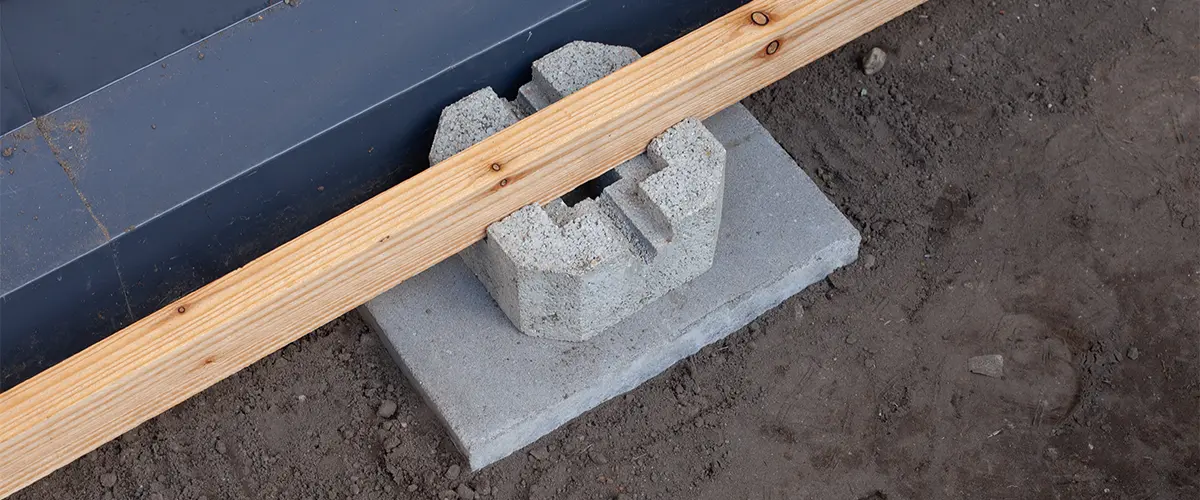
What Deck Blocks
Like we mentioned above, a few years back, the norm was to bury the wood post in the ground and hope for the best. Naturally, the wood will develop rot and will be the main victim of pests, and being buried in wet dirt doesn’t help at all.
Today, wood deck posts are installed on a concrete base, or what we call deck blocks. These support the weight of the entire deck and help the wood stay away from the ground.
Important: Even if you have pressure treated wood posts rated with ground-contact, constantly exposing the wood to water and excess humidity will weaken the wood, causing it to eventually fail.
What Are Deck Blocks Made Of
Deck blocks are made of concrete. They’re built in such a way that the post goes directly in them, not allowing it to move at all.
- Concrete deck blocks need to be installed below the freezing line of the area you live in. Because the ground freezes and thaws constantly during the winter and spring, this can hurt the structural integrity of your deck, eventually weakening the joists and screws. Installing the blocks below the freezing line minimizes the risk of your entire structure to move around.
- Precast deck blocks are the most common option for builders and homeowners, but concrete can also be poured on site to form a block. However, pouring concrete takes skill, tools, extra materials, and most importantly, a lot more time than buying already poured concrete.
Despite concrete being extremely durable and strong, there are also plastic deck blocks. Check out this page on Lowe’s to find different deck blocks models. However, if we were in your place, we’d stick with concrete.
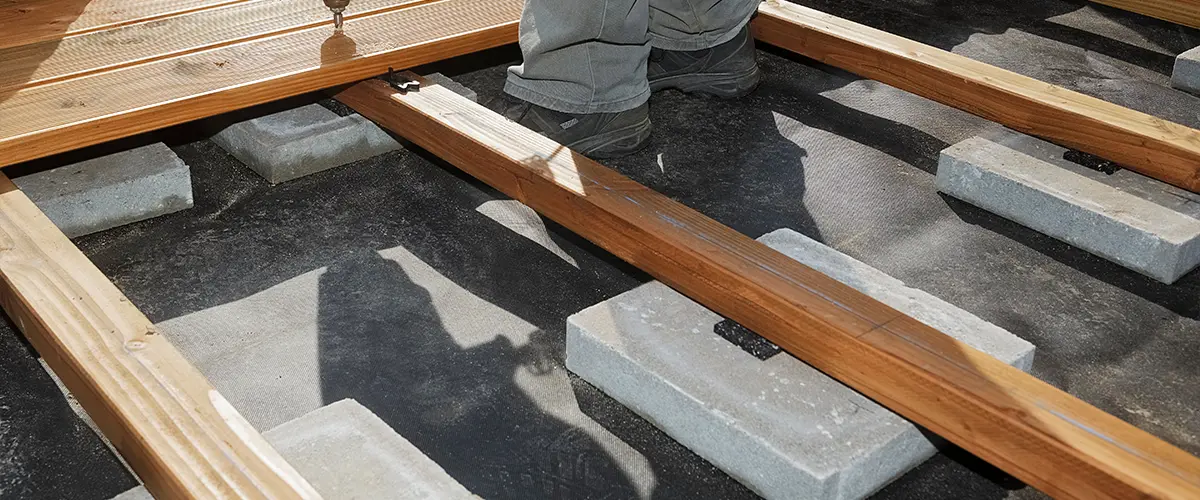
How Much Do Deck Block Cost
A concrete deck block costs anywhere from $3 to $10 each, depending on the size and type of block. If you’re building a floating deck, you’ll need deck blocks in more places beneath your deck. You’ll need at least 16 blocks for a small deck, and more for a larger deck.
For elevated decks, you’ll need larger and more resistant deck blocks.
Depending on how many deck blocks you’ll need, how large they are, and the materials they’re made of, you’ll end up spending anywhere from a couple hundred dollars to $500.
Deck Blocks Alternatives
If you’re interested in concrete deck blocks alternatives, you should know there are some great options out there that will work just fine.
Concrete Footings
If you want a smoother and more aesthetic look for your deck, poured concrete footings are the way to go.
A concrete footing is literally concrete poured in a hole, and then the deck post is placed in it. This method is great for elevated decks that have a concrete patio beneath them, as it helps keep the space sleek and modern.
Concrete footings have different styles, like a concrete pier, a bell, and others, so make sure you consult with your contractor first. However, concrete piers are very common and efficient.
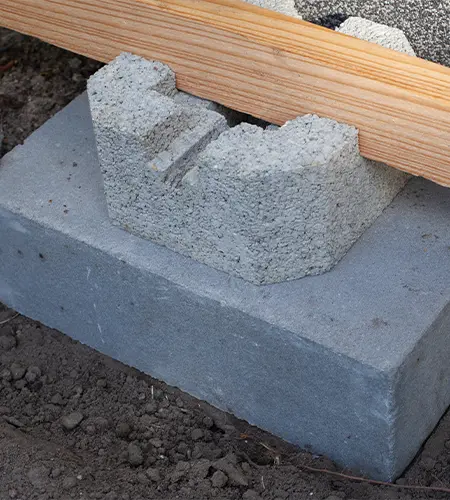
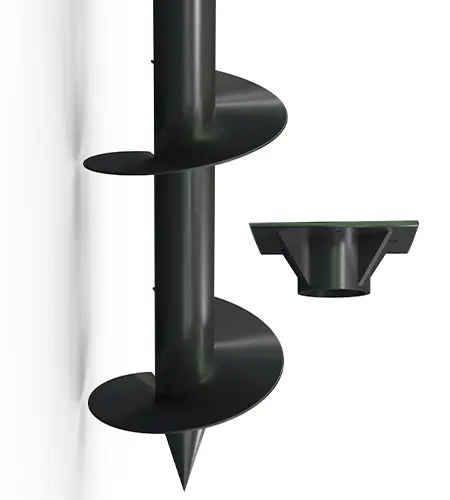
Engineered Helical Piers
Helical piers are a system designed to leave no budget even if there is frost heave. Although they can be used to decks as well, these are more common in home foundations.
Because of their high price and the heavy machinery needed to install them, they’re not always worthy to use in a deck. However, if you need more security than what concrete deck blocks offer, this remains a solution worth considering.
Ground Anchored Spikes
Ground anchored spikes are more commonly used for fencing, but if you’re getting a more quality product, you can actually use them as a good deck foundation option.
Installing ground anchor spikes (especially if used on a deck) is a real challenge, even for pros. It involves either a lot of strength and a sledge, or an expensive tool like a jackhammer.
Besides, the anchor spike can bend or get crooked in the ground, which means you’ll have to take it out, replace or fix it, and try again.
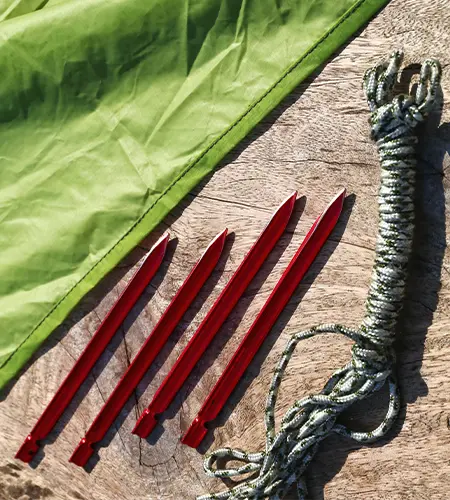
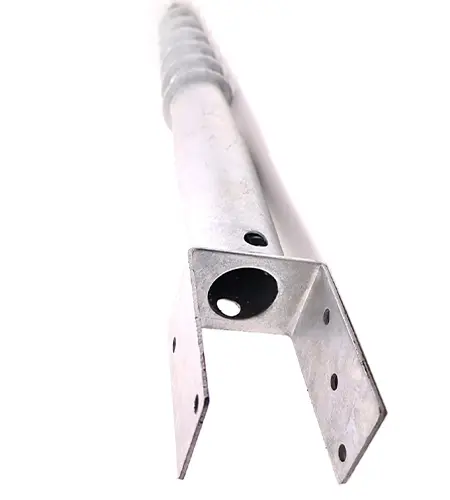
Ground Screw Anchored Footings
This is a very fast and affordable alternative to deck blocks, but infinitely less reliable. The method consists of a saddle where the wood post goes in, the load plate that spreads the weight of the deck on the ground, and an auger that screws deep in the ground.
Although these can work just fine for a ground level deck with not a lot of weight, using this for a large deck where you’re planning to gather your loved ones is not a great idea.
Conclusion
Concrete deck blocks remain one of the best options to ensure your deck is structurally sound and is not going anywhere. They’re affordable, quick and easy to install, and offer the same efficiency as high-end footings like helical piers.
All it takes to install deck blocks is measurements, physics, and a lot of deck building knowledge. A skipped deck block or poor measurement can make the difference between a safe and sound deck and one that puts your life in danger.
Here at Werner Decks, we offer professional deck building installation in Annapolis, Arnold, Severna Park, and surrounding areas in MD. Our mission is simple: building decks that last for a lifetime, without sacrificing anything from their functionality or aesthetics.
If you want more information about the best deck blocks to use on your project, give us a ring at (443) 926-6996 or request a free quote and we’ll reach back to you as soon as possible!
